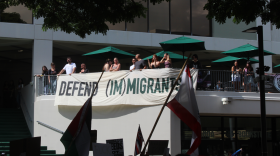Federal funding cuts have hit close to home for Maui residents — a grant program that supported wildfire recovery efforts has been terminated.
More than 130 Maui residents received notices on Feb. 24 that their jobs ended, effective immediately.
“It was 5 o'clock on Monday, 'Don't go to work tomorrow.' So it was immediate. It wasn't like you got a couple weeks,” said Ryanda Sarraude, who worked at Roots Reborn, a Maui organization that supports migrant and immigrant community members. “So it was a shock to all of us.”
Sarraude had previously lost her job because of the 2023 wildfires. Her recent position at Roots Reborn had been funded through the National Dislocated Workers Grant — which provided positions at 27 Maui organizations in fire recovery efforts.
The National Dislocated Workers Grant is a program awarded by the U.S. Department of Labor to provide temporary funding in response to major economic dislocations, or in cases of disaster recovery.
The program had been scheduled to run through September but was unexpectedly cut short due to funding uncertainty.
Now, Sarraude says she’s back to square one.
“I was a victim of the fire, and now I'm victim of the political climate and not having really a lot of time to plan ahead and as far as not being able to work,” she said. “So I'm going to go on unemployment temporarily, I'm actively looking for work.”
The funding went through a long trail before it got to Maui residents.
The U.S. Department of Labor partnered with the state Department of Labor and Industrial Relations, and funding was administered locally by Maui Economic Opportunity. Residents were employed by Employers Options, a Maui staffing agency, and individuals were placed with the 27 local organizations as host sites.
More than $12 million in federal funds had been awarded for the program incrementally. Last month, though, the U.S. Department of Labor notified the state that funding to continue the program was limited. A state DLIR spokesperson said they’re still waiting for the release of funding to cover reimbursement for February’s costs.
The spokesperson told HPR the state is hopeful the U.S. Department of Labor will continue funding the program in the future, but that because of current uncertainty, the state terminated the contract with MEO.
Funding cuts in the aftermath of the 2023 fires
Jordan Hocker of Maui Housing Hui, a grassroots organization for tenant advocacy, was employed through the program.
“I think everyone who's in this program is in it because they care, and they've been doing the work to help our survivors in their displacement,” she said. “And now those people are displaced themselves, looking for work and kind of thrown out, with no notice, into our highest cost of living and our most expensive housing market.”
Maui Housing Hui had two positions funded through the program. Hocker described the grant as providing the funds for “our community to be supported to support our community,” with residents finding meaningful work in the recovery effort by helping each other.
MEO Chief Administrative Officer Maggie Batangan said the program employed those who lost jobs after the wildfires, providing opportunities in debris cleanup, humanitarian services and recovery support.
“This program was really launched with wonderful intentions in the midst of a really difficult time in the aftermath of the wildfires, and the program was stood up quickly to help people impacted,” she said.
Some organizations have been able to keep some or all the employees that had been under the program, and are now stretched thin looking for funding alternatives.
Victoria Mendoza-Jachowski, co-founder of Roots Reborn, said the program’s shutdown “forced us to reassess” the organization’s core services.
“For us, it was part of our long-term sustainability plan, was to retain our staff [hired through the program],” she said. “We've made strategic adjustments to our staffing to keep five… of the original seven team members that were on the grant project — and it basically has allowed us to preserve our core operation, but it did create a funding gap."
"Our team has demonstrated remarkable resilience, and everyone is contributing additional effort and time to ensure that that's a disruption to our services and ultimately to our community is minimal,” she continued.
Meanwhile, Mendoza-Jachowski said they’re spread thin.
The Council for Native Hawaiian Advancement’s Kākoʻo Maui recovery program was one organization hit hard. They had 17 employees from the National Dislocated Workers Grant program.
Their Kākoʻo Distribution Center, a go-to for fire survivors to connect with critical direct assistance services, had to close temporarily. It is back open as of this week.
Batangan said MEO is helping residents find other work.
“At this time, we are currently working with partners to explore funding opportunities and options, and I know some sites are working as well to leverage their own resources for that,” she said. “And we're also hoping to help mitigate the impacts in our community by really working closely with these 131 folks to help them find placements and find worthwhile employment.”






